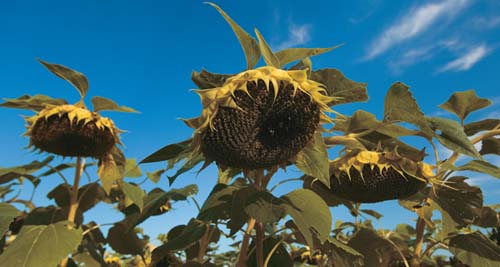 |
 |
| current issue |  |
past issues |  |
send a letter/news |  |
address update |  |
advertise |  |
about us |  |
alumni home |
Features
The Green TeamPage 2 of 4
 ENERGY INDEPENDENCE: Seeking to reduce both expenditures and emissions, UNH is investigating importing methane gas from a local landfill and helping to build a mini-processor that can convert sunflower seeds to biodiesel.
ENERGY INDEPENDENCE: Seeking to reduce both expenditures and emissions, UNH is investigating importing methane gas from a local landfill and helping to build a mini-processor that can convert sunflower seeds to biodiesel.
|
Other captains make their way on foot or hop on the campus shuttle. This is what transportation looks like on a "walking campus," which is precisely what UNH is striving to be. "The walking campus is a cornerstone goal of the master plan," says Steve Pesci '87, '92G, manager of special projects for Campus Planning. Walking, bike riding and bus riding are encouraged by consolidating larger lots on the edges of the core campus and providing a high-frequency shuttle service around campus.
The UNH bus system isn't successful just because it's convenient, though. It's also clean. Really clean. Six brand new compressed-natural-gas buses ferry students, faculty, staff and the public around campus. Purchased with federal air-quality funding, the sleek, futuristic vehicles are 25 percent more efficient and less polluting than buses running on gasoline or diesel fuel.
The balance of the Wildcat Transit fleet runs primarily on a blend of 80 percent petroleum diesel and 20 percent biodiesel, processed from biological sources like vegetable oil. The recently expanded fleet carries almost 1 million passengers a year, making it the largest transit system in the state.

|
Last summer, the university began converting its service vehicles (including construction and maintenance vehicles) to compressed natural gas, electric or the biodiesel blend. Every vehicle switched over means fewer heavy metals and less sulfur dioxide and carbon dioxide are being spewed into the air. Burning biodiesel also reduces cancer-causing particulates by as much as 82 percent. Much of the work has been funded with federal money designated for air quality improvement.
The new biofuel is so promising, in fact, that UNH is starting to work with local farmers who grow crops that have fuel potential. In the sunlit fields at the Kingman Research Farm in Madbury, N.H., local farmer Dorn Cox recently led UNH Extension Specialist Becky Grube and visitors from Vermont on an inspection of a planting of sunflowers. Gesturing to the nodding flowers, heavy with black seeds, Cox described his arrangement with UNH: he will harvest and refine the oil from the plants, reporting quality and quantity data that will be available to farmers and researchers everywhere.
Biodiesel will also be produced at UNH's Woodman Farm with a small-scale processor built with funding from the College of Life Sciences and Agriculture and the Office of Sustainability. The miniature patent-pending apparatus will convert waste vegetable oil from UNH's kitchens to biodiesel that can be used as a heating fuel or in off-road farm equipment.
Meanwhile, the vision of a walking campus has sparked other energy-saving changes at UNH—like the construction of a vehicle/pedestrian/bike tunnel under the railroad tracks on the south side of campus, to be built with $6.5 million in federal money. Next summer, bike lanes will be added along Main Street, too. Plans to rebuild the historic UNH Dairy Bar are also in the works, expanding the building to include a functioning station once again for Amtrak trains and buses. "It will be pretty messy and dusty next summer," Pesci notes, "but it's all part of a creating a more balanced transportation system and landscape—permitting people to move around using less energy and creating fewer emissions."
Page: < Prev 1 2 3 4 Next >Easy to print version

